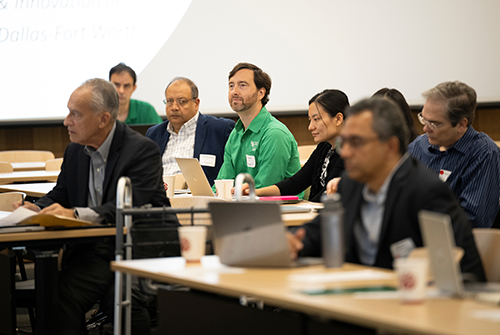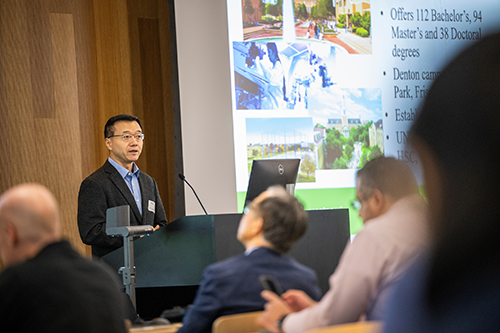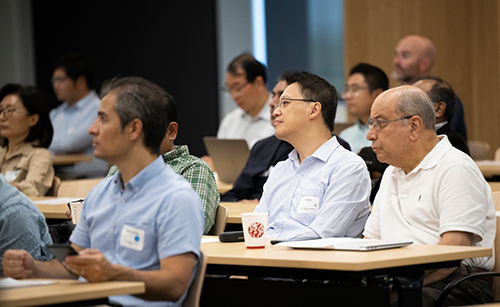
FRISCO, Texas — Faculty from four Dallas-Fort Worth area universities gathered at the University of North Texas at Frisco to cultivate further relationships and joint action for advancing artificial intelligence.
As the world moves toward a future where AI is as widespread as electricity, researchers from UNT and other area universities are harnessing the power of AI to transform a variety of industries from healthcare and business, to transportation, logistics and national security.
UNT hosted the first-ever DFW University AI Collaboration Symposium at Frisco Landing to foster discussion on ways to work together on AI-related research. The symposium was on put on in collaboration with the Texas Research Alliance. Industry representatives, government leaders and over 100 faculty members from four universities — UNT, the University of Texas at Arlington, the University of Texas at Dallas and Southern Methodist University — attended.
Paul Krueger, dean of the UNT College of Engineering, kicked off the day, solidifying the theme of collaboration among attendees.
“AI is pushing us in new directions towards an as yet unknown strange new world,” Krueger said. “Today, we’ll have the opportunity to discuss how we can work together to address a range of challenges in healthcare, consumer technology, financial services and education.”
Director of the Texas Research Alliance, Victor Fishman, echoed Krueger’s message.
“Today is about building up the capabilities of our partner universities. We will share, connect, learn and propose,” said Fishman. “These partnerships will help make Dallas-Fort Worth a leading force in AI.”

From self-driving vehicles and medical imaging to monitoring participation in classroom discussions, representatives from area universities shared about the current research being conducted at their institutions.
Song Fu, professor and associate chair for research in the UNT computer science department, overviewed the research underway at UNT. Spanning disciplines from engineering and computer science, to business and emergency management, UNT faculty are exploring ways AI can be used to solve industry challenges and preparing the future workforce in this area. Currently, UNT is one of the few universities in the state of Texas offering a Master of Science in Artificial Intelligence.
“UNT is taking the lead in hosting this event,” said Fu, who organized the symposium alongside UNT computer science colleagues Gergely Záruba (Chair) and Trey Castillo. “The information from this symposium will be used to build industry and government funding opportunities for faculty and establish regional coalitions that can then take the lead for use-case opportunities.”
UNT already has examples of success in its established research alliances. Through UNT’s Center for Integrated Intelligent Mobility Systems (CIIMS), researchers are paving the way for the future of transportation and mobility — working to accelerate collaboration between manufacturers, logistics professionals and emerging technologies to develop unmanned aerial vehicles, autonomous cars and robots.
The university’s most recently funded AI research includes foundational work to help robots and unmanned aerial vehicles more efficiently communicate and make decisions as well as a regional network for logistics innovation and a national effort to fuel discovery of emerging vehicle technologies.
Symposium attendees got a jumpstart on potential new collaborations during smaller break out sessions toward the end of the event focused on discussing major topics concerning AI such as using the technology responsibly, its role in healthcare and how it could be used to benefit society. They also discussed the different research opportunities each topic presented. They then regrouped to share their findings with each other.
“We found our conversation went beyond the proposed questions,” associate professor Mark Albert said. “There’s so many opportunities surrounding AI, especially in healthcare. We just need the funding to keep up with it.”
The day ended with Fishman encouraging the group to keep the collaborative spirit going forward.
“Our students are running towards AI, so we need to run faster. Let’s keep this momentum to create more collaborations between our North Texas universities and partners, turning Dallas-Fort Worth into a leader for AI research.”
***
The Texas Research Alliance is a non-profit organization made up of four chambers of commerce in Dallas-Fort Worth. The alliance’s mission is to grow research capacity and technology commercialization in North Texas. It helps connects companies, philanthropies and public agencies with research experts at North Texas higher education institutions.
